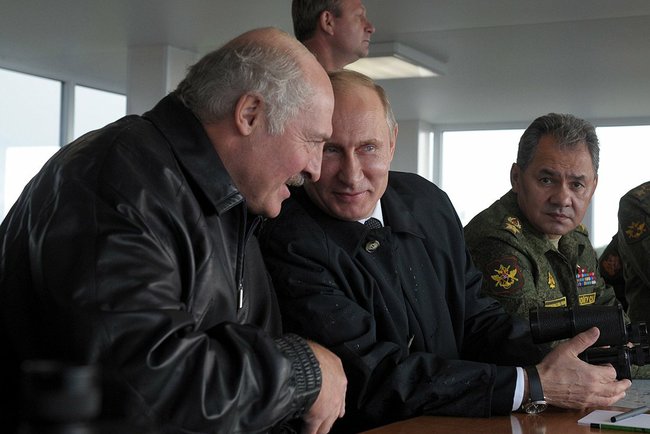 Photo Credit: www.kremlin.ru
Photo Credit: www.kremlin.ru
Zapad Puts Spotlight On Belarus-Russia Tensions
Russia has been preparing to launch large scale military exercises for this September, and its neighbors—including NATO allies Poland, and the Baltic States—have expressed concerns over the extent and intent of these wargames during a tense period in NATO-Russia relations. The wargames, named Zapad (“West” in Russian), occur every four years, but this year various sources claim that Zapad is simply an excuse to pre-position Russian forces closer to NATO. Former-Georgian President and now Ex-Governor of the Ukrainian region of Odessa, Mikheil Saakashvili, has gone as far to suggest that Zapad is cover for Russia to outright annex Belarus, repeating how it annexed Crimea from Ukraine in 2014.
Zapad-2017 being cover for annexing Belarus is unlikely, as regional experts point out. But the theories do put a spotlight on Russia’s relations with the former-Soviet Republic, especially in an era of increasing Russia-NATO tension. Belarus has traditionally been a strong Russian ally, and Alexander Lukashenko—who has been Belarus’ president since 1994—has often been quick to support Russia and President Vladimir Putin. The two nations even formed a joint political body known as the Union State, and the Zapad wargames are only one of multiple avenues of cooperation between them.
However, Belarus’ relationship with Russia has come under greater strain in recent years. Despite such close ties, disagreements have often occurred between the two countries and their leaders. Lukashenko has disagreed publicly with Russia over the ongoing conflict in Ukraine, showing support for his southern neighbor’s sovereignty and trying to act as a mediator in the conflict. But the most glaring examples of disagreement are the high profile rows between the two nations on the issue of oil and natural gas. Belarus has clashed with Russia openly over the pricing and transit of oil and gas in 2004, 2007, 2010, and earlier this year.
However, the dispute of 2017 has a different flavor to past disagreements, occurring during the largest protests against Lukashenko since he assumed office, and stemming from his institution of a “parasite tax” on the unemployed. It also came right as Lukashenko had been flirting with the idea of closer ties to the West, with the EU having finally lifted human rights sanctions against Belarus after five years. Russia appeared to retaliate for this by turning the screws on Lukashenko when he was the most vulnerable he’d ever been. These events even provoked Lukashenko to lash out publicly at his ally.
The ordeal was ultimately resolved in the aftermath of the Saint Petersburg metro bombings in April of this year. Following Belarus’ statement of grief and support, its gas debt was promptly refinanced and new energy discounts were offered for 2018 and 2019, followed by the promise of $1 billion in new loans for purchasing energy. This happy resolution for Lukashenko occurred against the backdrop of a massive crackdown on protestors by his security services, which raised the specter of the EU reimplementing human rights sanctions and signaled an apparent turn back towards Russia.
The context and outcome of this most recent dispute show how Russia is restricting Belarus’ ability to act independently as a state, and this is not by Lukashenko’s choice. Belarusian state media has emphasized how highly Lukashenko values Belarusian sovereignty. And in a 2014 article from The Guardian reflecting on twenty years of his rule, Lukashenko seemed to make his intent to defend his country’s independence clear: “No matter who comes to Belarusian land, I will fight. Even if it is Putin.” On this occasion, the fight was only one of words and money, but Belarus was still compelled to sign a peace that made it more dependent on Russia. The question remains how Lukashenko would react in a war that wasn’t only of words.
As Zapad-2017 begins, Russia and Belarus remain allies. But in the aftermath of this year’s gas dispute, Russia will likely continue to give Belarus reminders that its position as Russia’s western buffer does not permit it the freedom of action that Lukashenko desires. If Russia’s confrontation with the West continues, it will likely continue working to curtail or curb Belarus’ ability to endanger Russia’s western flank. While they shouldn’t overblow the situation, regional experts must be prepared for a split or confrontation between Belarus and Russia. The current situation in Ukraine already shows how tragic a lack of imagination can be when dealing with security in Eastern Europe. And with Belarus situated right against NATO’s western-most border, the stakes there would be far higher than in Ukraine should Russia one day attempt to turn an ally into a puppet.





